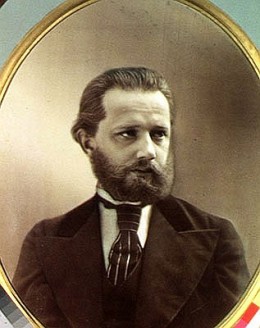История рода Фон Мекк
Tchaikovsky & von Meck: Romantic Music Part 12
Peter Ilyich Tchaikovsky 1840-1893 (2)
There were always “two” Tchaikovskys. One was Tchaikovsky the public figure, a great and talented composer, ultimately world-famous for being the creator of so much wonderful and memorable music. Then there was the private Tchaikovsky, a gay man who was very depressed about it, and who spent money like water, more than likely on unknown men that he met and had relations with. For he was deathly afraid of a public scandal, so he lived alone and kept his private life as secret as possible, although those close to him knew the true story. Homosexuality—sexuality of all kinds, actually—was not something that was discussed openly, which is tough for us to wrap our minds around today. But I think we can all understand how Tchaikovsky desired to please his supportive father, who wanted his son to marry and have children, and who just could not fathom why a handsome, intelligent, talented man like the composer had not done this.
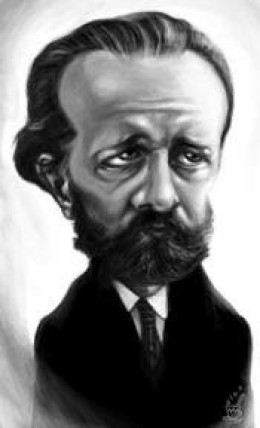
Does life imitate art, or does art imitate life?
Before we proceed to the direct relevance of this question (Don’t worry, we won’t try to solve this age-old mystery here!) we should note that Tchaikovsky began to compose operas in the late 1860s. In 1877 he started work on Eugene Onegin(1879), an opera that has retained its solid position in the standard repertoire, and whose drama turns on an adoring letter sent by the heroine Tatiana to the protagonist Onegin—who spurns her. This character, because of his coldness, ends up killing his best friend and being morbidly unhappy.
Now, it was just about this exact same time when Tchaikovsky, an extremely sensitive individual, received more than one adoring, even worshiping, love letter from a former piano student, Antonina Ivanovna Miliukova, a simple soul who had no idea about the composer’s true sexuality and probably wouldn’t have understood it if he had told her. The story goes that Tchaikovsky, who did not want to end up like Eugene Onegin, did not spurn the poor girl and agreed to marry her. Apparently he hoped that by doing this he would become “normal” just like anyone else.
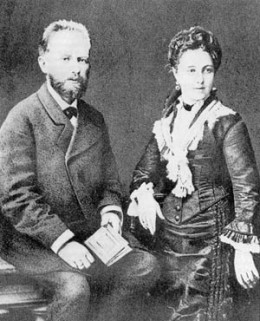
Marrage to Antonia Ivanovna Miliukova
This was not exactly a marriage made in heaven and, given the difficulty of divorce in Russia at that time, although they stayed married for the rest of their lives, they lived together for less than three months. As we have mentioned there were people close to Tchaikovsky who knew what the composer was really like. One of these was Nikolai Rubenstein, brother of St. Petersburg Conservatory director and famous composer Anton, and the director of the Moscow Conservatory—the man who had given Tchaikovsky the teaching job there and was a strong champion of his music.
One afternoon, when Antonina Ivanovna was expecting her husband to come home (By this time, Tchaikovsky had flown the coop to Switzerland!), Nikolai Rubenstein and one of the composer’s brothers, Anatoly, showed up unexpectedly. Without mincing words Rubenstein told the hapless woman about her husband’s real sexuality. Whether she comprehended what he told her right then is open to question. Today—like so many traditional “myths” and “legends”—academics seem to “pooh-pooh” the connection between the letter in Eugene Onegin and Tchaikovsky’s marriage. There were in fact a number of reasons why the composer took this disastrous step. But there is absolutely no doubt whatsoever that the whole thing was triggered by letters from Antonina Ivanovna at the time he was deeply involved with Onegin.
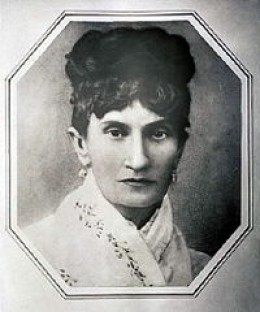
In walked an Angel
Tchaikovsky’s failed marriage puts the composer as a man into perspective—somewhat. In other words no story about him can purport to be complete without mention of this woman in his life, even though his relationship with her was doomed from the start. Given then who Tchaikovsky was as a man (the “private Tchaikovsky”), it is a little odd—and definitely ironic—that neither is a story of his life complete without a discussion of yet anotherwoman in the composer’s life—Nadezhda von Meck, his great benefactress.
Almost all great artists in the Western tradition have had their financial benefactors or “angels” going all the way back to the Greek tragedians. This is one phenomenon that was not among the changes that came with Democracy, Napoleon and the Industrial Revolution and all the technological miracles of the 1800s. Even the great Verdi needed help to get started. Tchaikovsky, who was a poor money manager especially needed financial help. Part of his problem was that he needed the job at the Moscow Conservatory because he needed a salary to pay the rent, even when his compositions were selling like crazy. And because he had to hold down the job, he couldn’t put more effort into composing. But then Nadezhda von Meck entered the picture.
Nadezhda von Meck was a very strong and very rich woman who had inherited her husband’s vast railroad holdings at his death in 1876. Actully she was perhaps more responsible for the acquisition of this fortune than her husband, who appears to have been a very talented engineer but had shown himself to be an underachiever as a businessman until Nadezhda gave him a sharp kick in the pants. She knew that it was time for railroads in Russia.
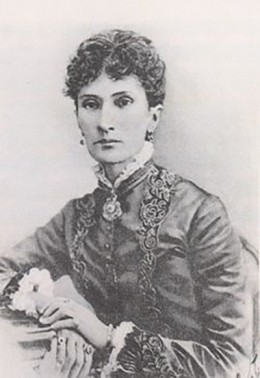
Dedicates 4th Symphony to von Meck
Besides being a shrewd businesswoman and domineering mother of 11 children, she was also an amateur pianist and lover of the arts. A person who never came to grips with any kind of sexuality, von Meck felt that Tchaikovsky was a kindred spirit when his marriage failed so badly and the composer seemed to be resolved to live alone. She began to subsidize him substantially around then because Tchaikovsky dedicated his Fourth Symphony (one of the greatest works of its kind) to her in 1878.
Soon von Meck was funding Tchaikovsky to the tune of 6,000 rubles per year—a king’s ransom!—and more than enough for him to quit his teaching job and focus all his energy on music. There was just one condition attached to this arrangement—that they would never meet. Except by the slightest of accidents, with no words exchanged, Tchaikovsky and von Meck never did meet in the 13-plus years that she patronized him. If she was hoping to inspire him to compose some great music, she certainly got her money’s worth—see the pieces listed and their dates below.
Once again it was probably Tchaikovsky’s lifestyle more than anything else that brought matters to the point where von Meck was forced to end supporting the composer. Other issues were also greatly in play. For one, Tchaikovsky’s neice Anna had married one of von Meck’s sons. Initially this was a great source of joy for the rich patroness. But while she had been used to forcing her iron will on her other children, Anna would have none of it and actually balked often against her mother-in-law’s wishes.
Then there was the problem with the von Meck fortune. Possibly through mishandling by Nadezhda’s oldest son Vladimir, by 1890 it was nowhere as significant as it once was. And here the matriarch of the family was giving 6,000 rubles a year to Tchaikovsky, who was also now getting a comfortable pension from Czar Alexander III! It is said that the von Meck children finally stood up against their mother (whose health was rapidly deteriorating from tuberculosis) and threatened to make public Tchaikovsky’s homosexuality unless she stopped paying him the annual stipend. She stopped in 1890.
Tchaikovsky - Piano Concerto No 1 in B-flat minor, Op 23
More great Tchaikovsky music:
Concertos:
- Op. 23 Concerto No. 1 in B-flat-minor for Piano and Orchestra 1875 One of the composer’s most famous pieces, it features the theme from which the well-known song “Tonight We Love” is taken.
- Op. 33 Rococo Variations for Cello and Orchestra 1877 (At least I always think of it as a concerto!) For virtuosos only!
Opera - Op. 24 Eugene Onegin 1879 Based on Puskin’s long poem this opera is tuneful with a gripping drama!
Orchestral works:
- Op. 29 Symphony No. 3 in D 1875
- Op. 36 Symphony No. 4 in F-minor 1878 This is one of the greatest symphonies ever written. Each of its four movements is a gem that you’re sure to enjoy - appropriately dedicated to his generous patroness Nadezhda von Meck.
Women in World History: A Biographical Encyclopedia. COPYRIGHT 2002 Gale Research Inc.
von Meck, Nadezhda (1831–1894)
Wealthy Russian patron of music who supported one of her country's greatest composers during a critical period in his career, maintaining years of correspondence that provide valuable insights into the daily life and creative mind of Peter Ilyich Tchaikovsky. Name variations: Naddezhda, Nadeja, or Nadejda von Meck; Madame von Meck. Born Nadezhda Philaretovna Frolovskaya (also seen as Frolowskaya) (Надежда Филаретовна Фраловская) in Znamenskoye, near Smolensk, Russia, on February 10, 1831; died on January 13, 1894, in Wiesbaden, Germany[MISTAKE!]; father was an avid amateur violist; married Karl Fyodorovich von Meck (an engineer), in 1847; children: 18, of whom 11 survived.
Married at 16, encouraged her husband to leave the work he despised as a bureaucrat to strike out as a railroad entrepreneur; widowed, after her husband had garnered an enormous fortune, by his sudden death at age 46; turned to music, commissioning pieces from the young composer Peter Ilyich Tchaikovsky, who entreated his patron for a subsidy that would allow him to devote himself entirely to composing; began an intense 14-year correspondence with Tchaikovsky (1876); ended the relationship suddenly for reasons unknown (1890); death of Tchaikovsky followed by hers, only two months later (1894).
Patronage has long been central to art. The Greek Acropolis, the Sistine Chapel, and the operas of Mozart are all works created as a result of support from individuals or governments. One of the most famous examples of private patronage in history was that provided by the wealthy Nadezhda von Meck to the Russian composer Peter Ilyich Tchaikovsky, to whom she gave extraordinary moral and financial support for 14 years while he was establishing his reputation. The great legacy of Nadezhda von Meck includes not only the beautiful music of one of the world's best-known composers, but the lengthy correspondence that documents the unique friendship of this patron and artist and opens a window onto the creative workings of Tchaikovsky's mind.
Nadezhda Frolovskaya was born on February 10, 1831, near the Russian city of Smolensk, west of Moscow. Her youth was typical of an upper-class girl growing up in imperial Russia at that time, except for the intensity of her love for music and skill at the piano, cultivated by her father, who was a keen amateur violinist. Just before her 17th birthday, Nadezhda married Karl Fyodorovich von Meck, a 28-year-old engineer employed as a bureaucrat by the Moscow-Warsaw railway. Nadezhda soon gave birth to the first of 18 children, 11 of whom survived.
Karl's earnings were modest, and in the first years of marriage, life for the couple was hard. "I had to be wet-nurse, nanny, servant, tutor, and seamstress to all my children, and my husband's valet, book-keeper, secretary and aide," wrote von Meck. Such duties were unusual in the life of an upper-class woman. Nadezhda urged him to strike out on a new career. "In the civil service," she later wrote, "a man must forget he has a reason, will, human dignity—he is just a puppet, an automaton. I was unable to stand it, and begged my husband to resign…. When he did, we found ourselves in such straits that all we had was some twenty kopecks per day."
But the period of hardship was to pay off. During the 1860s, railways were being built throughout imperial Russia. At Nadezhda's urging, Karl found a financial backer and became a builder of railways. He quickly amassed a huge fortune, and the couple began to enjoy a life of luxury, moving between their sumptuous townhouses and large estates. The business acumen and foresight von Meck showed in encouraging her husband into entrepreneurship was rarely to fail her.
A beautiful, passionate woman, Nadezhda grew restless in her marriage and became involved with her husband's young secretary, Aleksandr Iolshin. While Karl remained unaware of the affair, their older children knew that their youngest sister, Liudmila , known as "Milochka," had a different father. When Milochka was four years old, one of the children revealed Nadezhda's transgression to Karl, and family legend has it that in response he suffered the fatal heart attack that killed him at age 46.
Left a wealthy widow, Nadezhda von Meck was nevertheless unprepared for her husband's untimely death. She became a recluse, and except for doting on her children, showed little interest in anything except music. She already employed a cellist to accompany her at playing the piano, and she soon hired a violinist, Iosif Kotek, to live with the family. Music was a commonplace and relatively inexpensive form of home entertainment for the wealthy. It was not unusual, in this preelectronic era, for Russians to hire musicians and composers to provide occasional music in their households. Kotek, a former pupil of Tchaikovsky, adored his teacher's music. It was he who suggested that von Meck commission Tchaikovsky to compose pieces especially written for piano and violin. Tchaikovsky agreed, and in late 1876 he and von Meck began to correspond.
You are the only person in the world from whom I am not ashamed to ask for money. In the first place, you are very kind and generous; secondly, you are wealthy. I should like to place all my debts in the hands of a single magnanimous creditor by whom I should be freed from the clutches of moneylenders.
—Peter Ilyich Tchaikovsky to Nadezhda von Meck
Peter Ilyich Tchaikovsky had been born into a family that had served Russia's tsars for several generations, mostly as army officers. His uncle and namesake had fought against Napoleon's troops when they invaded Russia in 1812. His father Ilya, a mining engineer of prominence in the mining town of Votkinsk, had many serfs and a hundred cossacks at his disposal. As an important civil servant, the elder Tchaikovsky could provide for his large family, and he married three times, losing his first two wives to illness and death. Tchaikovsky's mother Alexandra gave birth to six children, adding to the two by the first marriage. Tchaikovsky was 14 when his mother died, and he mourned her passing all his life. His father's third wife had no children, but Peter maintained lifelong attachments to all his siblings.
Tchaikovsky showed an early interest in music and began to study the piano at a young age. When his father retired and moved the family to St. Petersburg, Tchaikovsky obtained a law degree and a position at the Ministry of Justice. He was handsome and charming and created a brilliant social life on the fringe of high society, but he was dissatisfied with the practice of law. When he resigned from the ministry to devote himself entirely to music, he imposed an economic hardship on a family fortune that had never been large. At first he earned money giving piano lessons and accompanying singers. At age 26, he became a professor of harmony at the Moscow Conservatoire, where he composed his first three symphonies, his first Piano Concerto, three operas, the tone poem Romeo and Juliet, and the ballet Swan Lake. He was on the brink of fame but still struggling economically when Iosif Kotek contacted him about writing music for Nadezhda von Meck.
Peter Ilyich Tchaikovsky was high strung and intense, a complex person whose moods lapsed at times into depression. He has been described as "over-sensitive, over-shy, weak of will and overwhelmingly, frighteningly strong of emotion," and it was not unusual for him to avoid concert halls where his music was being performed, or to shun his family and friends. Seeming at times to flee human society, he could also be attractive and charming, and was greatly loved by those who knew him. The composer Rimsky-Korsakov described Tchaikovsky as "sympathetic and pleasing to talk to, one who knew how to be simple of manner and always speak with evident sincerity and heartiness. A man of the world in the best sense of the word, always animating the company he was in." The loss of his mother, inborn emotional complexity, and creative genius explain much about the character of Tchaikovsky, but his homosexuality also accounts for some aspects of his personality. Living in morbid fear of discovery, he eventually went so far as to marry to disguise his sexual persuasion.
In late 1876, the 36-year-old Tchaikovsky was delighted to obtain a commission from the 45-year-old widow, but he remained in dire financial straits nonetheless. It was Nikolai Rubinstein, virtuoso pianist and Tchaikovsky's superior at the Moscow Conservatory, who suggested to the young composer that he apply to his new mentor for a loan. After von Meck wrote that she would like to know the composer better, their relationship blossomed through a correspondence which grew voluminously into hundreds of letters written over a 14-year period.
From the outset, however, it was a basic tenet of this remarkable friendship that von Meck and Tchaikovsky would never meet. Still a recluse at this stage, von Meck may have feared repeating the physical relationship which might have resulted in her widowhood. In any case, she wrote to the composer, "the more fascinated I am by you, the more I fear acquaintance." Tchaikovsky, shy as he was, and fearful his homosexuality might be discovered, was more than happy to honor her request. Although the two lived near each other at times, and occasionally saw each other at a distance, they met only twice, and then by accident.
Von Meck quickly assumed a central role in Tchaikovsky's emotional and professional life. In 1877, the year after their correspondence began, the composer wrote that he had decided to marry Antonina Ivanovna Milyukova , who was a virtual stranger to him. He perhaps hoped that Milyukova would look after his needs, but the marriage proved from the outset to be a disaster. Writing to von Meck, Tchaikovsky never describes his problems with a physical union but dwells on the incompatibility existing between bride and groom. Von Meck, who wrote of her great reservations about the marriage, also offered him what epistolary support she could during the months when the relationship was dissolving. By the end of the first year, the intensity of both correspondents had made the composer and his patron emotionally dependent on one another. But when Madame von Meck suggested that they should assume the intimate form of address with one another, Tchaikovsky declined to do so.
Nevertheless, the relationship assumed a more intimate dynamic. After von Meck asked for photographs not only of Tchaikovsky but other members of his family, large numbers of pictures were exchanged. Their letters were also filled with comments about political events, gossip, family events, and personal observations. The two were compatible as conservative Russians devoted to the tsar and the Orthodox Church during a period when the imperial system was under attack from radicals. Music, of course, was also an important topic. Von Meck did not like Mozart's music, for example, while Tchaikovsky adored it. He endeavored to change her musical taste, and wrote about his works in progress, explaining sections as they were composed. A great deal of what is known about his composition of Eugene Onegin and the Fourth Symphony comes from their correspondence, and his Fourth Symphony was dedicated to von Meck, his "beloved friend."
Von Meck's support began as occasional subsidies, and gradually increased until she was sending Tchaikovsky a generous monthly stipend amounting to more money in two months than he had made teaching at the Moscow Conservatory in a year. When he eventually decided to resign his post to devote himself to composing full time, the decision met with von Meck's full support. Her generous patronage allowed not only new creative freedom but a chance for the composer to travel abroad. She also made her estates, including the magnificent Brailov, available for him to visit often for relaxation.
Tchaikovsky was never a prudent money manager, and it was not unusual for him to give away large amounts of the money von Meck bestowed upon him. When his funds were low, she sent more or doubled his monthly allowance. This extraordinary generosity and moral support continued until the composer was professionally well established and financially secure.
How and why the end of this unique relationship came about is not clear. At the time, she wrote to him that financial catastrophe meant her subsidies must be discontinued, and although it is true that her family suffered a temporary setback, railroads were soon booming again. Other members of von Meck's family wrote to the composer that her health had deteriorated, making it impossible for her to continue writing, and Tchaikovsky probably feared that she had been put off by learning of his homosexuality. This may even have been true, because stories about his liaisons circulated continuously. More probably, however, von Meck's many living children resented their mother's financial output, especialiy
after his compositions had begun to earn him a great deal of money. Whatever the reason, Tchaikovsky bitterly resented the end of this friendship, and it is said that her name was on his lips when he died of typhoid three years later, at age 53. Von Meck died two months later.
Tchaikovsky, in a sense, was the wealthy patron's dream. Without her support of him, Nadezhda von Meck would have been just another wealthy Russian widow. With it, he produced some of his greatest compositions, including such major works as the Sleeping Beauty ballet, his Fifth and Sixth symphonies, Hamlet, and Eugene Onegin. Von Meck, in turn, was the artist's dream—a non-judgmental figure, and a haven, perhaps even the mother that he always missed. Tchaikovsky wrote her, "I have never in my life encountered another soul as kindred and close to me as yours, responding so sensitively to my every thought, my every heartbreak." And for posterity, there is not only the music but the mind of the musician, revealed through his moods, his attitudes, and his intimate views on his own compositions throughout the hundreds of letters he wrote to his patron.
sources:
Bennigsen, Olga. "A Bizarre Friendship: Tchaikovsky and Mme von Meck," in The Musical Quarterly. Vol. 22, no. 4. October 1936, pp. 420–429.
——. "More Tchaikovsky von Meck Correspondence," in The Musical Quarterly. Vol. XXIV, no. 2. April 1938, pp. 129–146.
Bowen, Catherine Drinker and Barbara von Meck. "Beloved Friend": The Story of Tchaikowsky and Nadejda von Meck. NY: Random House, 1937.
Brown, David. Tchaikovsky: A Biographical and Critical Study. Vol. I. NY: W.W. Norton, 1981.
——. Tchaikovsky: The Crisis Years 1874–1878. Vol. II. NY: W.W. Norton, 1983.
——. Tchaikovsky: The Final Years 1885–1893. Vol. IV. NY: W.W. Norton, 1993.
——. Tchaikovsky: The Years of Wandering 1878–1885. Vol. III. NY: W.W. Norton, 1986.
Craft, Robert. "Love in a Cold Climate," in The New York Review of Books. Vol. 40, no. 19. November 18, 1993, pp. 37–41.
Garden, Edward, and Nigel Gotteri, eds. "To my best friend": Correspondence between Tchaikovsky and Nadezhda von Meck 1876–1878. Trans. by Galina von Meck. Oxford: Clarendon Press, 1993.
Griffiths, Paul. "Perfect Partners: The romantic dialogue of a melancholy composer and a passionate lady," in The Times [London] Literary Supplement. No. 4705. June 4, 1993, p. 18.
Tchaikovsky, Piotr Ilyich. Letters to his Family: An Autobiography. Trans. by Galina von Meck. NY: Stein and Day, 1981.
Volkoff, Vladimir. Tchaikovsky. A Self-Portrait. London: Robert Hale, 1975.
JohnHaag , Associate Professor, University of Georgia, Athens, Georgia
Nadezjda Filaretovna von Meck (Надежда Филаретовна фон Мекк), född 10 februari (29 januari enl. g.s.) 1831 i Snamenskoje, guvernementet Smolensk, död 13 januari (1 januari enl. g.s.) 1894, var en rysk friherrinna, affärskvinna och mecenat. Hon fick stor betydelse för kompositören Pjotr Tjajkovskijs liv och utveckling. Hans fjärde symfoni är tillägnad henne.
Den franske tonsättaren Claude Debussy påverkades också av sina kontakter med henne.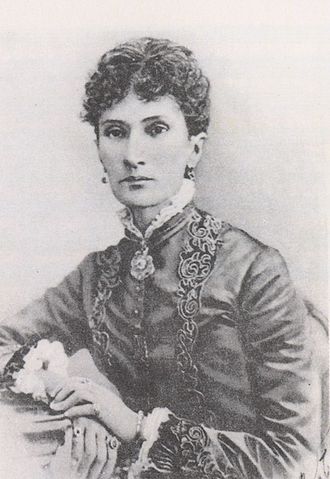
Nadezhda von Meck (1831-1894)
original text: http://www.bbc.co.uk/radio3/classical/tchaikovsky/atoz/tchaik_n_von_meck.shtml
While the modern Maecenae who support the arts and culture with their personal fortunes often make their money from financial dealings or new technologies, in the 19th and early 20th centuries some of the biggest fortunes were made from the engineering opportunities created by the industrial revolution. The Princesse de Polignac supported a host of French composers and instrumentalists who attended her Paris salon; but her maiden name was Winnaretta Singer: she was an heiress of the Singer sewing machine family. For Andrew Carnegie, a super-Maecenas who gave away almost his entire fortune of $350m on philanthropic projects, the money was made in Pittsburgh steel and related industries.
 And earlier still, Pyotr Ilyich Tchaikovsky was to become the indirect beneficiary of the expansion of the railways across Russia: it was in this industry that Karl von Meck made his fortune - his wife Nadezhda Filaretovna found herself in charge of it when Karl passed away when she was only 41.
And earlier still, Pyotr Ilyich Tchaikovsky was to become the indirect beneficiary of the expansion of the railways across Russia: it was in this industry that Karl von Meck made his fortune - his wife Nadezhda Filaretovna found herself in charge of it when Karl passed away when she was only 41.
Family were of great importance to Nadezhda: she and her husband produced 18 children, of whom 11 survived into adulthood. Their son Nikolai Karlovich married Anna Davidova, whose mother was Tchaikovsky's sister; so, Nadezhda was the mother-in-law of Tchaikovsky's niece.
With a quantity of marriageable daughters and a penchant for music (Nadezhda's father Filaret Frolovsky was keen on it), there is some evidence that Nadezhda thought of composers as suitable marriage-partners for her offspring: as such an outlook was directly contrary to the orthodox view of composers, it may have been fuelled by the notion that Nadezhda would at least be able to see to it personally that there were no impediments to the financial well-being of the said daughters. Debussy had spent time as a music teacher to her family - she gave him financial support and tried to press a daughter on him. Tchaikovsky may also have been lined up in Nadezhda's sights, for just this purpose.
Be that as it may, Nikolai Rubinstein and Tchaikovsky were also to receive support from Nadezhda, and in the latter case the sums were substantial. Their (platonic) relationship started in 1877; it could hardly be other than platonic because Nadezhda insisted that they should not meet (although two accidental meetings did not even prompt a conversation); and another reason - Tchaikovsky's homosexuality - might not have been fully appreciated by the wealthy widow. It is thought that this discovery may have accounted for the abrupt termination of their correspondence in 1890.
But by then, Nadezhda had provided Tchaikovsky with an annual allowance of 6000 roubles (clerking at the Ministry of Justice might have netted him 300-400 a year); this was more than sufficient to enable him to leave his professorship at the Moscow Conservatory and concentrate on his compositions.
Nadezhda's support extended further than the merely financial: she was profoundly stirred by Tchaikovsky's music, and took a close interest in it, supporting him through critical attacks, notably in the case of the Fifth Symphony. The Fourth is dedicated to her.
© Graeme Kay/BBC
Nadežda Filaretovna von Meck, in russo: Надежда Филаретовна фон Мекк  (10 febbraio 1831 – 13 gennaio 1894), è stata una mecenaterussa, vedova del magnate delle ferrovie russe Karl von Meck.
(10 febbraio 1831 – 13 gennaio 1894), è stata una mecenaterussa, vedova del magnate delle ferrovie russe Karl von Meck.
Nadežda Filaretovna von Meck fu considerata una formidabile donna d'affari ma la si ricorda oggi perlopiù per la sua relazione col compositore russo Pëtr Il'ič Čajkovskij. Musicista ella stessa, assistette finanziariamente, oltre al grande russo, anche Nikolai Rubinstein e Claude Debussy.
Ma fu col gigante di Votkinsk che la von Meck si dimostrò generosissima e disinteressata. Gli garantì copiose risorse sin dai di lui primi anni di studio ed apprendistato, e sebbene Čajkovskij si rendesse ben presto non più dipendente da tali elargizioni, la von Meck continuò a sovvenzionarlo fino al 1890, quando ella, bruscamente, interruppe tale rapporto, forse infastidita dalle voci sull'omosessualità del grande compositore. Tuttavia, questa motivazione non è universalmente accettata ed un vasto dibattito, con varie tesi, si è sviluppato nei decenni sull'argomento.
Čajkovskij la ripagò dedicandole la sua Quarta Sinfonia. Nonostante le molte diverse versioni sulla fine della loro relazione platonica, è certo che il legame che li coinvolse fu molto intenso.
Nadežda von Meck morì di tubercolosi il 13 gennaio 1894 a Nizza, appena due mesi dopo la scomparsa di Čajkovskij. Alla nipote Anna venne chiesto come la compianta madrina della musica avesse accettato la scomparsa del maestro ma la risposta fu "Non la poté accettare".

